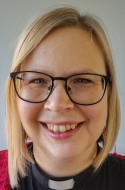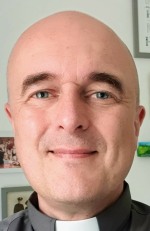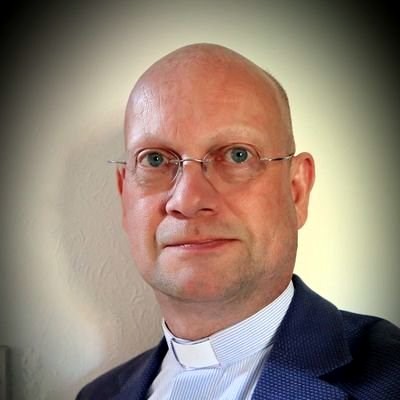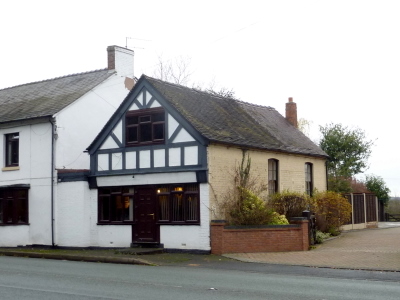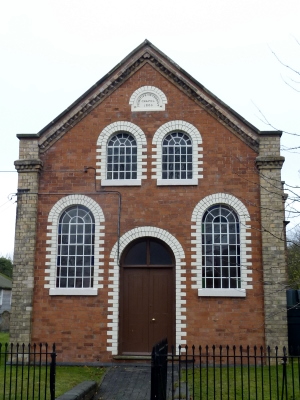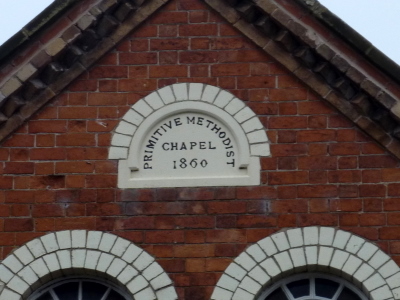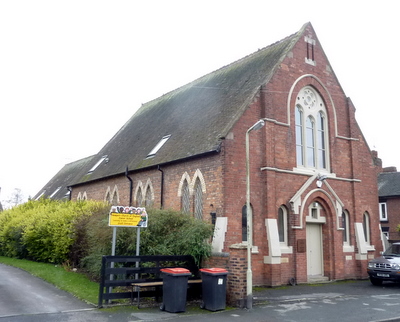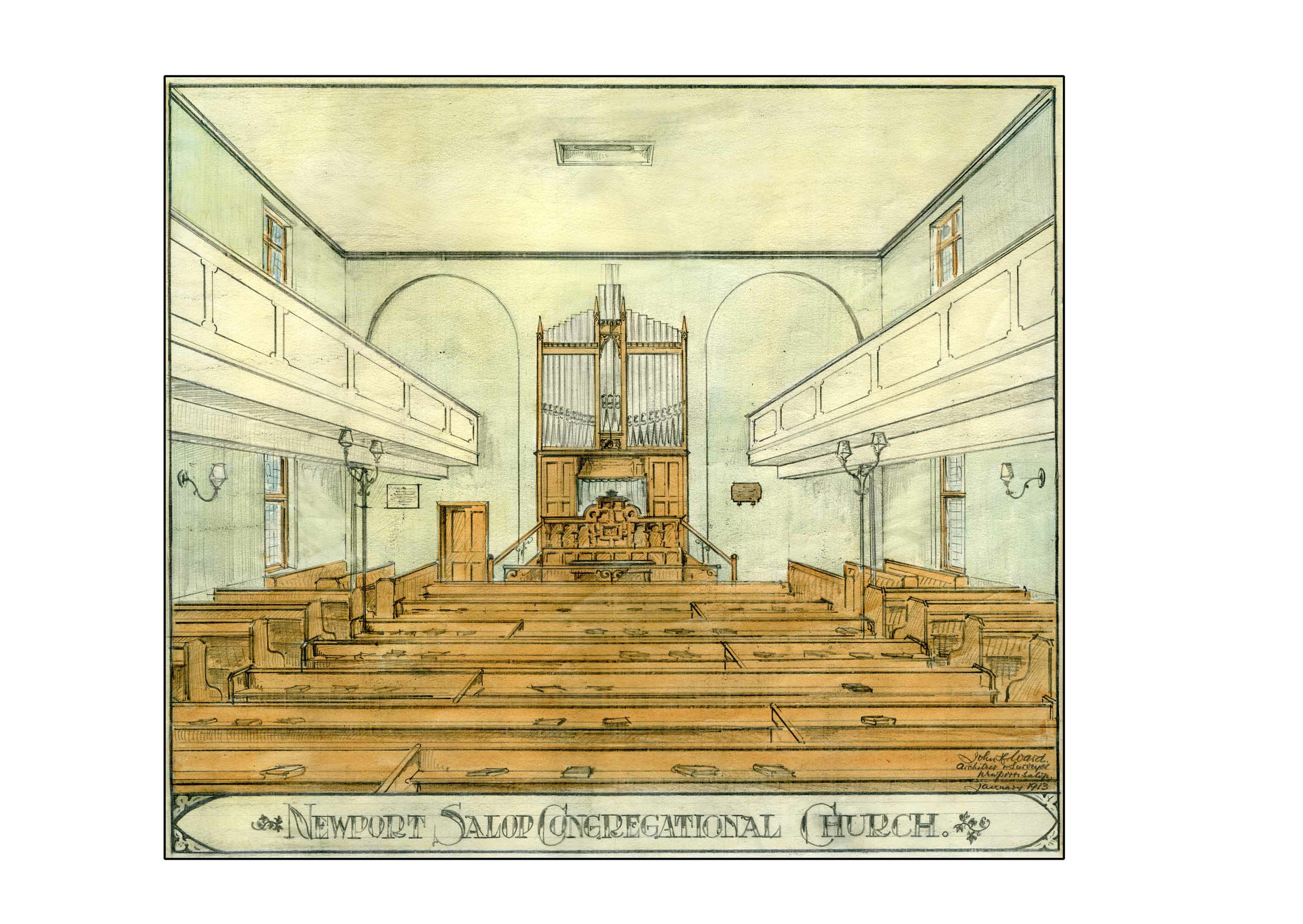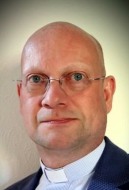An occasional collection of articles, most of which were previously published in the church magazine
|
Revd Camilla Veitch joined us from the Area Ministry of the North Derbyshire Resource Area and was East Midlands Synod Clerk. . Camilla serves the Shropshire area URC pastorate which looks after the URC churches of Shropshire |
|
|
Mark has just joined us and says "I am a newly ordained minister, who was born and bred in Wrexham, North Wales. I am married to Collette and have two daughters, Lydia and Hannah. I trained at Northern College Manchester and look forward to sharing in the love of God in the years we have together." Mark serves the Shropshire are URC pastorate which looks after the URC churches of Shropshire |
|
| Revd Adrian Burdon is the superintendent of the Telford Methodist Circuit. He came to us with his family from the Oldham Methodist Circuit of which he was superintendent. He was previously Principal of the Methodist Theological Collage in Tonga where he was responsible for training young ministers for the Tongan Methodist Church. |
Revd Adrian Burdon |
DATA PRIVACY STATEMENT
May 2024
Trinity Church, Newport, Shropshire
A Methodist/URC Ecumenical Partnership
1. Personal data
Personal data relates to a living individual who can be identified from that data. Identification can be by the information alone or in conjunction with any other information in the data controller’s possession or likely to come into such possession. The processing of personal data is governed by the General Data Protection Regulation (the ‘GDPR’).
2. Data Controller
The Trustees of the Methodist Church are the data controller (contact details below). This means they decide how your personal data is processed and for what purposes.
3. How do we process your personal data?
Trinity Church complies with its obligations under the GDPR by keeping personal data up to date; by storing and destroying it securely; by not collecting or retaining excessive amounts of data; by protecting personal data from loss, misuse, unauthorised access and disclosure and by ensuring that appropriate technical measures are in place to protect personal data.
We use personal data for the following purposes: -
to administer membership records;
to maintain our financial accounts and records (including the processing of gift aid);
to provide news and information about events, activities and services at the church;
to fundraise and promote the interests of the church;
to manage employees and volunteers;
to enable the church to provide voluntary services for the benefit of the public in our local community;
to provide information to the Methodist Circuit for the purpose of administration of the Methodist Church. As we are members of both the Methodist Church and United Reformed Church, data may also be shared with the United Reformed Church.
-
What is the legal basis for processing your personal data?
-
In general organisations are only permitted to process data where it is necessary for their legitimate purposes
-
Processing of data which records or implies a person's religious views is prohibited, except that churches are permitted to do so provided the processing relates only to members or former members (or those who have regular contact with it) and that there is no disclosure to a third party without consent
-
Processing of data may also be undertaken where it is necessary for carrying out obligations under employment, social security or social protection law, or a collective agreement;
-
Other processing may be undertaken where explicit consent of the data subject has been given.
5. Sharing personal data
Your personal data will be treated as strictly confidential and will only be shared with those connected with the church for purposes connected with the church. Where required, this may include the wider Methodist and United Reformed Church organisations of which we are part. We will only share your data with third parties with your consent.
6. How long do we keep data?
We retain data on the following basis:
|
Record Type |
Retention Period |
|
Membership rolls |
Indefinitely |
|
Members, adherents and friends contact details |
24 months after the last contact |
|
Junior Church roll |
until the child/young adult reaches the age of 21. |
|
Junior Church contacts |
24 months after the last contact |
|
Cradle roll |
Indefinitely |
|
Gift aid declarations and paperwork |
6 years after the calendar year to which it relates |
|
Registers of Marriage |
As required by the Registrar General |
|
Register of Baptisms |
Indefinitely |
|
Register of Funerals |
Indefinitely |
|
Personal data relating to events for which additional information is gathered eg Church holidays |
Disposed of immediately after the event unless anything has occurred (eg an accident) which indicates that records should be retained for a longer period. |
|
Records of attendance of children/young people and helpers |
Indefinitely for safeguarding purposes |
|
Photographs and videos of events |
24 months after the event – selected items retained for historical records |
|
Insurance Records |
Indefinitely |
|
Safeguarding matters |
Indefinitely or until advised otherwise by authorities |
|
Accident Books |
3 years from the date of the last entry (or, if the accident involves a child/ young adult, then until that person reaches the age of 21) |
|
Complaints (non -safeguarding) |
3 years after resolution of complaint (unless further action is anticipated) |
|
Minute Books |
Indefinitely |
|
Employee Records |
6 years after the date of termination of employment |
|
Pension Records (money purchase) |
6 years after transfer or value taken |
|
Visitors Books |
12 months from last entry |
|
Data holder listings |
Data deleted 12 months after relinquishing responsibility |
7. Your rights and your personal data
Unless subject to an exemption under the GDPR, you have the following rights with respect to your personal data: -
-
The right to request a copy of the personal data which Trinity Church holds about you.
-
The right to request that the Church corrects any personal data if it is found to be inaccurate or out of date;
-
The right to request your personal data is erased where it is no longer necessary for the Church to retain such data;
-
In cases where your consent has been needed, the right to withdraw your consent to the processing at any time;
-
The right to request that the data controller provide you with your personal data and where possible, to transmit that data directly to another data controller.
-
The right, where there is a dispute in relation to the accuracy or processing of your personal data, to request a temporary restriction is placed on further processing;
-
The right to object to the processing of personal data;
-
The right to lodge a complaint with the Information Commissioners Office.
8. Further processing
If we wish to use your personal data for a new purpose, not covered by this Data Protection Notice, then we will provide you with a new notice explaining this new use prior to commencing the processing and setting out the relevant purposes and processing conditions. Where and whenever necessary, we will seek your prior consent to the new processing.
9. Contact Details
To exercise all relevant rights, queries or complaints please contact the Trustees via the Church Secretary, Trinity Church, Wellington Road, Newport, Shropshire, TF10 7HD
Full details of the Methodist Church’s national policy on data protection are available at:
https://www.tmcp.org.uk/about/data-protection/managing-trustees-privacy-notice
You can contact the Information Commissioners Office on 0303 123 1113 or via email https://ico.org.uk/global/contact-us/email/ or at the Information Commissioner's Office, Wycliffe House, Water Lane, Wilmslow, Cheshire. SK9 5AF.
Pastorate Profile
Trinity Church
Newport
Shropshire
A Methodist-United Reformed Church Local Ecumenical Partnership
Trinity Church seeks to enable people to explore the Christian life of faith, worship and service in a friendly and welcoming environment.
Website (trinitynewport.org.uk) Facebook page (Trinity Church, Newport)
Background
There has been a nonconformist presence in Newport for at least 250 years. The first recorded chapel was built by Dissenters, and the present building in Wellington Road, a listed building in classical style, was built as a Congregational chapel in 1832, becoming a URC in 1972. Methodism arrived a little later with several chapels in the area giving rise ultimately to the chapel in Avenue Road in 1876. The Methodist and URC congregations came together in 2001 in the Wellington Road chapel as an ecumenical partnership creating a single congregation. A major refurbishment programme was undertaken in 2008, creating a light airy flexible building with a modern link corridor joining it to the adjacent function rooms. There is a good audio system with loop and projection system. The pipe organ, the only one surviving in Newport, is highly regarded for the quality of its construction and tone; it has been fully reconditioned and is used at all of our services.

The church is about a quarter of a mile from the centre of town. Newport is an attractive market town, now absorbed administratively into the Telford and Wrekin district but maintaining its distinct identity.

(Picture: Steve McShane / Newport High Street / CC BY-SA 2.0)
The town is within easy reach the population centres of Telford, Stafford and Wolverhampton to which many of the residents commute daily. There is easy access to the M6 and M54 with main line rail services to London or the north within easy reach in Stafford. There has been extensive housing development in recent years and the population has grown rapidly, currently being estimated at around 12,000. Many students from the nearby Harper Adams University also find accommodation in the town during term time. The town is noted for the excellence of its schools which include both comprehensive and grammar schools. Telford was designated as a new town about 50 years ago and has grown steadily with many new industries and housing estates. There is a regular bus service from Telford to Stafford via Newport, providing a useful link to the shopping centres and railway stations.
There is a modern spacious manse within a few minutes walk of the church.
Church life
The church has a friendly and welcoming atmosphere. As with many churches its congregation is predominantly in the older age groups. Most of the members live nearby, either in Newport or the surrounding villages.

As an LEP the congregation includes a wide range of viewpoints. We mostly worship in the traditional style. We currently have 61 people on the membership list with around twice that number on the pastoral list. On a typical Sunday the morning service attracts a congregation of around 30.
A small number of children attend in the mornings and depart to their own session after a short time in the main service. A creche for young children is available as required
We use Singing the Faith as our hymnbook. When a minister is not available our services are led by local preachers or members of the congregation.
There are numerous weekday activities including a popular parent and toddler group (currently suspended), a sisterhood, a regular Saturday morning coffee morning for church and visitors alike. We have a choir which practises regularly and takes part in Sunday worship. Activities evenings (currently suspended due to Covid) are held from time to time on Saturdays and include organ concerts, choir performances, beetle drives, talks etc.
Contact has been established with local schools where members assist through “Open the Book” with assemblies and introducing young people to bible stories. Each summer we hold a week long Holiday Club for young people, attended with enthusiasm by some 30-40 children.

The building also provides a valuable community asset, being well used by Guides, Brownies, Rainbows, Tai Chi , church Art Group, local Choirs, AA , children's fitness group, Diddidance, drama group, and other groups for occasional use. The Church is particularly valued for concerts, as there are few other suitable venues in the town.
The church is involved with Churches Together in Newport and takes part in joint services at Easter and Christmas as well as in leading services at local care homes.
Governance:
We have a Church Council consisting of 12 leaders (including Church Secretary and Treasurer), the minister with a representative of the West Midlands URC Synod and the Telford Methodist Circuit). The Council meets 4 times a year, often simultaneously with the Church Meeting.
We have various informal committees covering aspects of Church life such as worship, mission, pastoral, property, finance, children and young people, communications. These groups are open to anyone interested but each is attended by at least one leader. They meet as necessary and make recommendations to the church Council and/or the Church Meeting.
People:
The Church family is an open, friendly community, encouraging and supportive towards each other and welcoming towards visitors. The congregation is responsive to those leading worship.
Many of our Church activities, such as Toddlers, Coffee Mornings and the group making prayer blankets, are run on a volunteer basis and a high proportion of the active congregation is involved in these. Members are much involved in running all our church activities and likewise in many forms of service outside the church.
Finance:
Our regular gift aided income covers our Circuit Assessment. Members are now encouraged to contribute by regular banker's orders. Our finances are relatively healthy and together with rental income we are able to cover maintenance costs of the building.
Vision for the future:
We believe we have a distinctive contribution to church life in Newport. There are many opportunities and needs in a growing community like ours and we would like to see the church reaching out more in appropriate ways in answer to those needs, and in the process strengthen our fellowship. We continue to take an active role in Churches Together in Newport.
Whenever the time for ministerial rotations approaches, we would hope to welcome a minister who would inspire us to change, progress in our understanding of the message of Jesus, help us crystallise our thinking and develop our work in our community.
We look for someone who, loving God, will love us and our town, someone we can love and take to our hearts.
A brief account of the history of Trinity Church, Newport
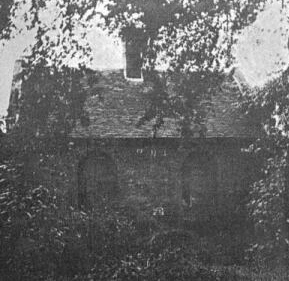
In 1792 a Congregational dissenter, Mr Moses Silvester, moved to the town to work for Lloyds Bank, living above the Bank premises. He contacted Mr Scott and arranged to reopen the old chapel which in due course attracted a small congregation with a Sunday School held at Mr Silvester's home. The chapel was subsequently demolished and a new Independent Chapel built further down Beaumaris Lane in 1803 where the first sermon was preached by the Rev George Burder of Bromstead. He and a number of other ministers assisted the chapel until the congregation was able to support its first resident pastor, Rev DH Creighton of Dublin. He and several other pastors served for relatively short periods until Rev John Whittenbury was appointed in 1828.
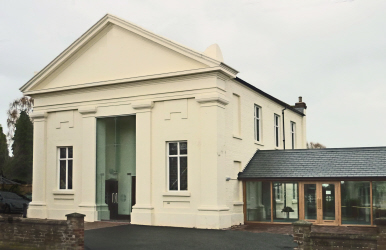 Under Mr Whittenbury's leadership the congregation grew and soon needed a larger building on which work was commenced in 1831. The Newport Independent(Congregational) Chapel, Wellington Road was opened in 1832 and is still in use 180 years later. At the opening service the first sermon was preached by Rev John Burder, of Stroud, son of the George Burder who was the first to preach in the old chapel. Sadly Mr Moses Silvester, who had worked tirelessly for the cause for nearly forty years, died before he could see the building completed. The former chapel was converted into cottages which have more recently been demolished.
Under Mr Whittenbury's leadership the congregation grew and soon needed a larger building on which work was commenced in 1831. The Newport Independent(Congregational) Chapel, Wellington Road was opened in 1832 and is still in use 180 years later. At the opening service the first sermon was preached by Rev John Burder, of Stroud, son of the George Burder who was the first to preach in the old chapel. Sadly Mr Moses Silvester, who had worked tirelessly for the cause for nearly forty years, died before he could see the building completed. The former chapel was converted into cottages which have more recently been demolished.
Mr Whittenbury left the church in 1832 after which there appears to have been something of a decline so that by 1839 there were only 19 members. At that point the church dissolved itself and reconstituted itself formally as an Independent congregation. Early in 1841 the Rev JF Mandeno of Wem succeeded to the pastorate and this was the start of another period of rapid growth. A large day school was added which ran for 40 years. The Sunday School flourished under Mr William Silvester, son of Moses Silvester, who ran it with his sisters. Under Mr Mandeno's ministry the gallery was packed with young people every Sunday. Outreach to the surrounding countryside began. A sick society was started. Many new members were accepted and by 1846 there were 97 members, an increase of 78 in just seven years. The death or removal of several prominent members of the congregation was followed by the departure of the pastor in 1848 and a period of decline followed so that by 1856 the membership was only 56. In that year the Rev William Paton of Wednesbury was appointed to the pastorate. His ministry was very successful, notably among the young people, and by 1863 the membership had risen once more to 82 despite further losses by deaths.
In 1865 a harmonium was introduced to accompany the singing and the New Congregational Hymn book adopted. At some stage a choir was formed and in 1880 it is recorded as being removed from the gallery to the body of the chapel. In 1865 Mr Paton departed the ministry and it was some years before a settled ministry was re-established. Financial problems also arose as several of the abler supporters of the church died including Mr William Silvester and his sisters.
The decline was arrested in 1872 by the appointment of Rev Henry Young of Levenshulme to the ministry. He brought fresh enthusiasm to the work, thirteen new members were recorded in 1874, a prayer meeting for young men sprang up, the outreach to Outwoods started in 1875 at the house of a Mr Simister, and by 1878 the membership stood at 100. The 1870's also saw the start of united meetings held with the other churches in Newport, rotating from church to church in turn. A major loss in 1878 was suffered by the death of another staunch member, Mr Charles Silvester, a deacon for the previous 13 years and in 1879 the minister departed to another pastorate. In 1880 the place of the Day School was debated and in the light of the educational policy of the government it was considered inadvisable to continue with it.
The chapel jubilee was celebrated in 1881. The Rev Clement Angel became pastor in 1884 and the church embarked on another period of growth and vitality. Correspondingly the finances improved and by 1885 the Manse Fund (which started as the Jubilee Fund in 1881) had reached £400, enough to consider buying a Manse, although the purchase was deferred until 1892. An evening school started in 1885, and in the same year Mr Mark Thompson died. During a lifetime of outstanding service he had been deacon for forty years, serving also as Treasurer and Sunday School superintendent. Tablets to the memory of Mr Mark Thompson and Mr Charles Silvester were erected in the church in 1901.
Quarterly evening communions were instituted in 1886. A major renovation of the church was undertaken in 1886 including new windows and new seats downstairs, followed by renovation of the schoolroom in 1889. The mission in Outwoods was now under the leadership of Mr G Beard in whose house meetings had lately been held. The mission had developed to the extent that work on a Mission Room was started, with work completed in 1886. The Rev Clement Angel relinquished the pastorate in 1891 and was succeeded by Rev R Newby Goldthorp. In 1892 the church was redecorated and a new heating system installed. A very popular Boys' Club was started around this time.

In 1865 Charles Horne moved to Newport from Sussex where he had been pastor of Cuckfield Congregational Church and the family became members of the chapel. Charles himself became editor of the Newport Advertiser, going into partnership with his wife's uncle Charles Silvester in a printing and bookselling business. Shortly before moving to Newport, Charles Horne and his wife had had a son Charles Silvester Horne. He was educated at Adams Grammar School and grew up in the church where he felt a calling to the ministry for which he clearly had a gift. It is recorded that his first ever sermon was preached in Mr Beard's kitchen at Outwoods. He trained for the ministry in Glasgow and Oxford and soon became pastor of the Whitefield mission in London where he achieved eminence as a national leader of the free churches. He wrote a number of hymns some of which are still sung today. He gave an address at the dedication of the memorial to his great uncle Charles Silvester in 1901. His father, Charles Horne, having served the church faithfully for many years died in 1903. Charles Silvester Horne became an MP in 1910 as a way of gaining a national platform for his views. He died suddenly aged 49 in Canada in 1914 whilst returning from a visit to New York and was the subject of widespread tributes nationally. His son Kenneth Horne achieved fame as a broadcaster and humorist.
The Congregational church became part of the United Reformed Church in 1972 and merged with the Methodist Chapel in Avenue Road in 2001 to become Trinity Church, a joint Methodist/United Reformed Church. A major renovation was undertaken in 2010.
The Methodist Chapels in Newport
|
|
|
|
The first Wesleyan Methodist Chapel was built in 1829 on Upper Bar. It was superseded by the Avenue Road Chapel and subsequently became a shop and theatre. |
A small Primitive Methodist Chapel was built at Pave Lane in 1862. It closed in 1883 but it was not sold off until 1928 and now forms part of an old peoples' home. |
| The first Primitive Methodist Chapel was built in 1830 on Stafford Road but was superseded by a new chapel on Wellington Road. It has since been demolished. | |
| .
|
|
|
In 1877 a new Primitive Methodist Chapel was built on Wellington Road to replace the Stafford Road Chapel. It closed in 1920 and is now the Masonic Hall, the original tablet in the gable end having been replaced with the masonic symbol. |
The design of the Wellington Road Primitive Methodist Chapel is a slightly larger version of the nearby Edgmond Primitive Methodist Chapel of 1860, which still carries its original tablet |
|
|
|
| The Wesleyan Methodist Chapel in Avenue Road was built in 1876 in a gothic style to replace the chapel on Upper Bar. The Avenue Road Chapel became Newport Methodist Church following the Methodist Union of 1932. After the congregation merged with the Wellington Road URC Chapel in 2001 the chapel was sold, subsequently becoming a gym and then a private house. | The Congregational Chapel, Wellington Road was built in 1831/32 in a bold classical style. It is now a listed building. |
|
|
|
| It became a URC chapel in 1972 when the Congregational and Presbyterian churches merged. | It became a joint Methodist/URC chapel after merging with the Avenue Road Methodist congregation in 2001. The photo shows the recent extension which links the chapel to the adjacent schoolroom |
|
|
 |
| Early drawing of the church interior | The modern interior |

